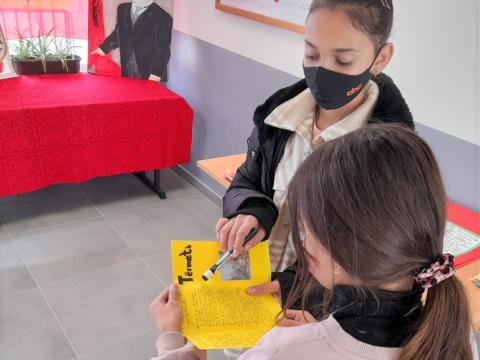We are here for one another

Megi is in the ninth-grade and loves to write and draw. The girl form Kurbin explains that during the pandemic lockdown, she often broke the monotony with her passions.
“First it seemed unbelievable. We did not think it could go so far,” says Megi remembering the first days of the pandemic. “After the first few cases were recorded, I was very afraid that COVID-19 could come to my family as well”.
These days of insecurity will stay in children's memory for long. Social distancing and staying home left Megi and many of her peers with only one mean of communication - the telephone.
“We were missing each other very much. As time was passing, I was dreaming of meeting my friends, talking to them, and having fun as before,” says Megi.
This isn’t the first time that Megi and her community have faced a big disaster. Two years ago, the earthquake of November 26, 2019 in Albania left behind a lot of damage and fear for many of Megi's peers not only in her community but also across the country.
When the danger of aftershocks passed and students returned to school, teachers guided them how to act and protect themselves in similar cases.
“Houses of many of my friends were destroyed and they suffered from the earthquake more than my family. Their experience was noticeable at school as well. In those moments, it was key to stay close to them and provide support,” says Megi.
Children hardly recovered from the consequences of the earthquake when pandemic was announced, bringing so much uncertainty and fear.
When Megi and her fellow students returned to school after the lockdown, teachers and students worked together on “React, save lives'' initiative.
They chose this topic because the consequences of the earthquake and pandemic had negative impact in their community. Children wanted and raise awareness on how to act in emergency situations.
“The pandemic was invisible and was spreading out quickly. Children were hidden transmitters of this virus. We had to be very vigilant to every case or symptom,” says Albana, a teacher at Megi’s school.
Students developed leaflets to raise awareness and inform their peers at school about the risks and explain how to protect themselves.
Young people also organised sport activities between classes to spend time together and to set aside negative thoughts and emotions. The school newsletter developed by the students was the place to inform about planned activities and showcase the results.
“After the earthquake we were very scared, above all for the safety of children, they were our greatest worry. We couldn't return to our daily routine for a very long time. Our eyes were on our children,” says Megi’s mother, Grisela. She’s relieved that her daughter and other youth are overcoming the challenges and helping one another at the same time.
The activities Megi and her peers initiated helped the participants have more information on how to act in emergency situations and be ready to support each other in difficult times.
“These activities are very helpful for all because being prepared now when natural “unexpected” phenomena are more and more frequent is essential,” says Megi. “We live during the pandemic and we should be careful in order to return quickly to ordinary life we had before COVID-19. Keeping the distance, wearing a mask and disinfecting hands is half-way to insuring we will win this pandemic.”
Megi and her classmates can face the future with confidence being better equipped with necessary knowledge to overcome disasters. And they know that they can rely on one another to get through the tough times.
13 initiatives were undertaken to raise community awareness and engagement in order to fulfill the security standards and Disaster Risk Reduction in schools in the framework of the project “Building Resilience and Skills for Disaster Risk Reduction through school and community engagement” implemented in Tirana, Kamza, Durrës, Kavaja, Kurbin and Lezha. This project is supported by UNICEF Albania, SDG Acceleration Fund, through the financing of the Netherlands Government and implemented by World Vision Albania, in coordination with the Ministry of Education and Sports and the National Agency of Civil Protection.